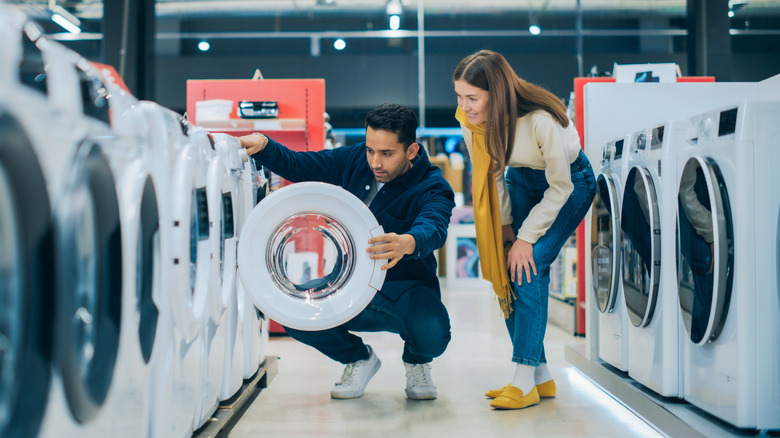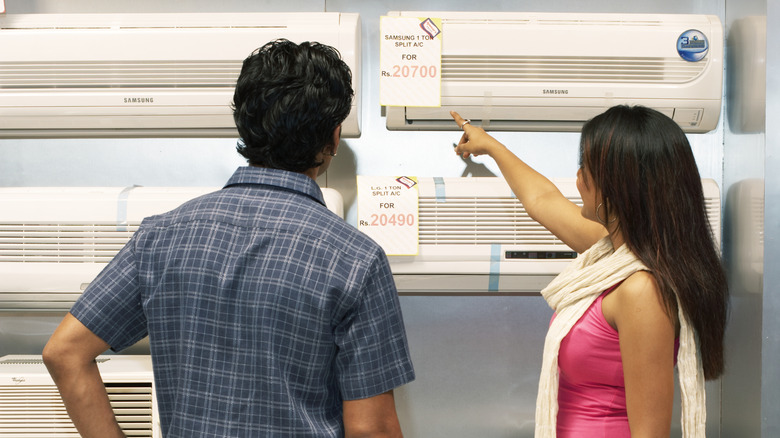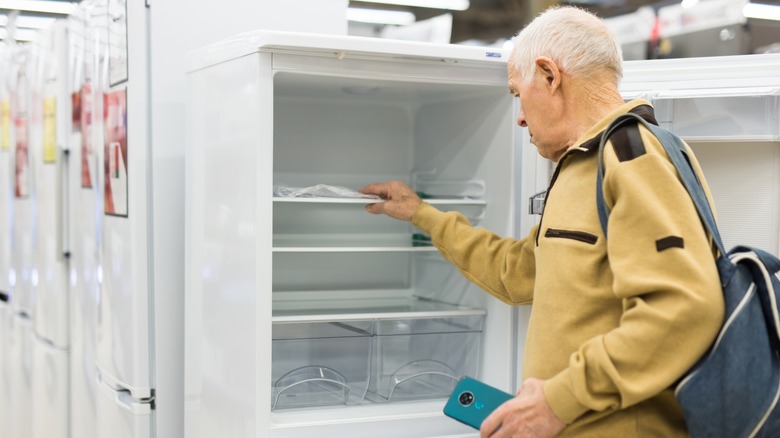Why Buying Older Mechanical Appliances Could Be Better For Your Wallet
Washers, dryers, refrigerators, dishwashers, and air conditioners are just a few major appliances we can't imagine living without. Just thinking about the extra work needed to compensate for the lack of machinery is tiresome. However, paying out of pocket for any of these appliances isn't cheap. While there are different ways to save money, like waiting for the best time of year to purchase a new home appliance, buying an older or used model might be the best option for your wallet. In an exclusive House Digest interview, we spoke to Asurion appliance expert Michael Cornell to get his take on whether buying older appliances is a good bargain.
When we say older or used products, we're not referring to beat-up items destined for the junkyard but appliances that were new to market in prior shopping seasons or sold at second-hand appliance stores and repair shops. "Ultimately, I would say that buying older or used appliances can be a great way to get the appliances that you need on a budget," Cornell said. "Do your research on the unit and keep a watchful eye on the unit before purchasing, and you should be very pleased with the savings you've pocketed." Our expert shared tips on what to look out for when buying older models so you won't regret your cost-saving purchase.
Buying used or older appliances can be a budget-friendly alternative
As the price of household appliances has gone up drastically in recent years, finding a discount on these big purchases is a win-win. Older units with mechanical controls–and less smart technology–are the answer for budget-conscious shoppers. Michael Cornell exclusively told House Digest, "Used appliances are sold cheaper due to newer technology rendering them 'antiquated' and majority of the time they aren't coming with any type of warranty." Older mechanical appliances typically have a longer lifespan than newer electronic models, so not having a warranty may be a risk worth taking.
"Another option is that they have been sitting in a warehouse for a while, and they need to be offloaded by the seller," Cornell said. "They will usually drop the price to get them out of the building." Distributors want to clear the sales floor to make room for the shiny new appliances, but the units they want out are still in good condition. Opting for older models can save you money in this scenario, but the appliance should pass Cornell's test before you take it home.
What to look out for with older appliances
When buying new appliances, there are certain things you must consider; when shopping for older appliance models, similar rules apply. Michael Cornell exclusively told House Digest, "First, you want to make sure that whatever you're buying can be serviced in the future." All the appliance's repair parts should be available in case any servicing is necessary. Otherwise, if the machine stops working, you have no choice in replacing or repairing that appliance; you'll likely have to buy an entirely new device.
Another thing to pay attention to is the appliance's condition. "Scratch and dent discounts are common, yes, however large dents on something like a washer, dryer, fridge, or dishwasher can make the unit operate poorly," Cornell warned. External damage could also be a sign the product was not stored well and that increases the possibility of internal leaks or broken machinery. It's not just dents but cleanliness you should look out for. Cornell suggested checking for "Tiny brown spots around the unit," which may indicate a pest infestation, "especially [near] the control board or power cords or bug carcasses in cavities on [the] unit." Whether the appliance is a used or old model, it should be operable and in good condition. It's a worthwhile purchase if there's no major damage, it's clean, and all the repair parts are still available. Opting for an older mechanical appliance can save you money at the initial purchase and in the long run.


